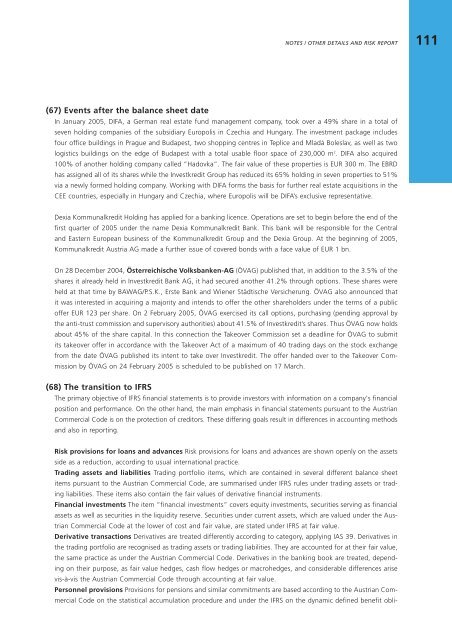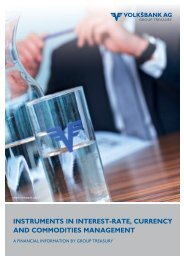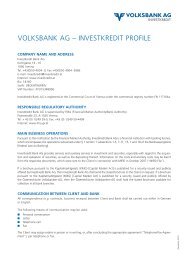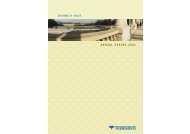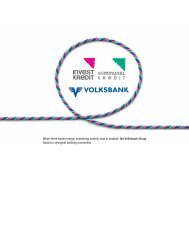Download (2.2 MB) - Volksbank AG
Download (2.2 MB) - Volksbank AG
Download (2.2 MB) - Volksbank AG
You also want an ePaper? Increase the reach of your titles
YUMPU automatically turns print PDFs into web optimized ePapers that Google loves.
(67) Events after the balance sheet date<br />
NOTES / OTHER DETAILS AND RISK REPORT<br />
In January 2005, DIFA, a German real estate fund management company, took over a 49% share in a total of<br />
seven holding companies of the subsidiary Europolis in Czechia and Hungary. The investment package includes<br />
four office buildings in Prague and Budapest, two shopping centres in Teplice and Mladá Boleslav, as well as two<br />
logistics buildings on the edge of Budapest with a total usable floor space of 230,000 m2 . DIFA also acquired<br />
100% of another holding company called “Hadovka”. The fair value of these properties is EUR 300 m. The EBRD<br />
has assigned all of its shares while the Investkredit Group has reduced its 65% holding in seven properties to 51%<br />
via a newly formed holding company. Working with DIFA forms the basis for further real estate acquisitions in the<br />
CEE countries, especially in Hungary and Czechia, where Europolis will be DIFA’s exclusive representative.<br />
Dexia Kommunalkredit Holding has applied for a banking licence. Operations are set to begin before the end of the<br />
first quarter of 2005 under the name Dexia Kommunalkredit Bank. This bank will be responsible for the Central<br />
and Eastern European business of the Kommunalkredit Group and the Dexia Group. At the beginning of 2005,<br />
Kommunalkredit Austria <strong>AG</strong> made a further issue of covered bonds with a face value of EUR 1 bn.<br />
On 28 December 2004, Österreichische <strong>Volksbank</strong>en-<strong>AG</strong> (ÖV<strong>AG</strong>) published that, in addition to the 3.5% of the<br />
shares it already held in Investkredit Bank <strong>AG</strong>, it had secured another 41.2% through options. These shares were<br />
held at that time by BAW<strong>AG</strong>/P.S.K., Erste Bank and Wiener Städtische Versicherung. ÖV<strong>AG</strong> also announced that<br />
it was interested in acquiring a majority and intends to offer the other shareholders under the terms of a public<br />
offer EUR 123 per share. On 2 February 2005, ÖV<strong>AG</strong> exercised its call options, purchasing (pending approval by<br />
the anti-trust commission and supervisory authorities) about 41.5% of Investkredit’s shares. Thus ÖV<strong>AG</strong> now holds<br />
about 45% of the share capital. In this connection the Takeover Commission set a deadline for ÖV<strong>AG</strong> to submit<br />
its takeover offer in accordance with the Takeover Act of a maximum of 40 trading days on the stock exchange<br />
from the date ÖV<strong>AG</strong> published its intent to take over Investkredit. The offer handed over to the Takeover Commission<br />
by ÖV<strong>AG</strong> on 24 February 2005 is scheduled to be published on 17 March.<br />
(68) The transition to IFRS<br />
The primary objective of IFRS financial statements is to provide investors with information on a company's financial<br />
position and performance. On the other hand, the main emphasis in financial statements pursuant to the Austrian<br />
Commercial Code is on the protection of creditors. These differing goals result in differences in accounting methods<br />
and also in reporting.<br />
Risk provisions for loans and advances Risk provisions for loans and advances are shown openly on the assets<br />
side as a reduction, according to usual international practice.<br />
Trading assets and liabilities Trading portfolio items, which are contained in several different balance sheet<br />
items pursuant to the Austrian Commercial Code, are summarised under IFRS rules under trading assets or trading<br />
liabilities. These items also contain the fair values of derivative financial instruments.<br />
Financial investments The item “financial investments” covers equity investments, securities serving as financial<br />
assets as well as securities in the liquidity reserve. Securities under current assets, which are valued under the Austrian<br />
Commercial Code at the lower of cost and fair value, are stated under IFRS at fair value.<br />
Derivative transactions Derivatives are treated differently according to category, applying IAS 39. Derivatives in<br />
the trading portfolio are recognised as trading assets or trading liabilities. They are accounted for at their fair value,<br />
the same practice as under the Austrian Commercial Code. Derivatives in the banking book are treated, depending<br />
on their purpose, as fair value hedges, cash flow hedges or macrohedges, and considerable differences arise<br />
vis-à-vis the Austrian Commercial Code through accounting at fair value.<br />
Personnel provisions Provisions for pensions and similar commitments are based according to the Austrian Commercial<br />
Code on the statistical accumulation procedure and under the IFRS on the dynamic defined benefit obli-<br />
111


